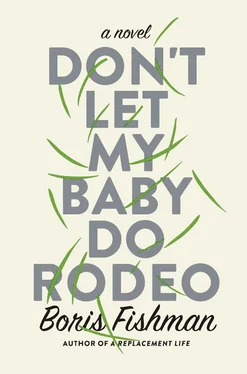“Rubins,” Gabe Mishkin said, astonished, from the other side of the screen door. “Boy, baby boy,” Mishkin said. “A little thing, but you didn’t pick him up. They showed up at your damn house.” Mishkin’s face opened in recollection. “That was one of the all-time doozies.”
Maya also could not believe she was standing across from the adoption supervisor. Alex’s call to IAS had given them the news that Mishkin had retired. The woman who replaced him wore a tunic marked by gamboling nautical objects and, in her ears, two turquoise crosses — it was to this that Maya attributed their difficulty understanding each other. No matter what Maya said — and eventually even Alex spoke up, embarrassment settling on the room after the new case worker mistook a back scratch for a reach for his wallet, that is, a forthcoming bribe — the woman returned her fingernail to the bolded text in the upper-right-hand corner of their file: CLOSED ADOPTION. Eventually, she let out a long, besieged breath and walked to the doorway to ask her secretary for a Form to Request Contact. That was when Maya’s hand reached for the penholder on the woman’s desk and swept it onto the carpeted floor. Maya apologized loudly and knelt to collect the scattered pencils and clips, but not before taking a long look at the file that remained open on the desk. She got a bit of luck — her eyes landed on an address. But luck rarely comes pure — it was the address not of the birth parents but the forwarding for Gabriel Mishkin, retired.
Mishkin had bellied out with new weight and his facial hair had taken after the woods surrounding his home: three days of messy, pebble-gray growth on his cheeks, and the stymied coiffure that he had sported as a savior of unwanted children was now out past his ears, though it managed to look elegantly disheveled instead of abandoned. Belatedly, Maya remembered that it wasn’t only Mishkin who was eight years older, and wondered what thoughts about her and Alex’s appearance passed through his mind.
“You’re on my porch,” Mishkin noted, burying his reading glasses in the copse of his hair. His other hand held a book, a wedged finger marking his spot. The three of them listened to a fluting call from the woods. An answer came, a series of taps. “At least I called you with a warning,” Mishkin said. He smiled without opening his mouth.
“Mr. Mishkin,” Maya said. She had practiced the simple line with Alex on their way up the Thruway, a sour fog blanketing the starting gold and red of the trees. They had decided that it would be more persuasive coming from Maya. “We need your help.”
“They gave you my forwarding?” Mishkin said, startled.
“Not exactly,” Maya said.
“I see,” he said. “I’m not being very hospitable.” He unlatched and swung open the screen door. Maya thrust at him a box of cellophaned chocolates.
“By the look on your face, I better take this,” he said.
The home had two stories, the chimney of a rust-edged woodstove rising through a clumsily hacked opening in the ceiling. Upstairs, Mishkin must have slept. Downstairs, he was deep in written work of some kind. The oval dining room table was covered with notebooks and books in plastic library covers. An aluminum can of turkey chili nested among the hardbacks, a spoon planted in its muck like a flag. On the kitchen counter, a dozen similar cans waited around. No woman would permit this, Maya thought. Was the adoption supervisor, who had filled out so many families, unmarried himself?
“It’s a bachelor lifestyle,” Mishkin said, watching Maya’s gaze wheel across his possessions. “You’re supposed to heat it up. Won’t you sit?” He indicated a torn leather sectional that spanned two of the walls in the living room. Maya and Alex fell into it like a final resting place, their knees higher than their waists. It would be impossible to make a formidable argument from this position, Maya thought, and tried to wedge herself out, unsuccessfully. “What can I offer you?” Mishkin said.
“Coffee?” Alex said.
“Actually, something stronger for me,” Maya said, “if that’s not impolite.”
Mishkin bowed his head admiringly. “That’s the very opposite of impolite, Mrs. Rubin,” he said. “The very opposite.” He retreated to the kitchen, where the Rubins heard the kettle filling with water and the rattling of cupboards.
“You remembered us right away,” Maya called out to him.
“Do you know how many families and children I helped bring together?” Mishkin called back. “Guess.”
“Twenty-five?” Maya yelled.
“Ha!” Mishkin cried. They heard the dull seat of a bottle land on the tile of the cooking counter, then fumbling with glasses. “Try a hundred and fifty, Mrs. Rubin.” Glasses were fondled and they heard ice cracking. “I bet you’re wondering what are all those things on the dining room table. I’m writing my memoirs. And I guess it’s some kind of serendipity — do you know what serendipity means? — to have you show up on my doorstep, because if you think about it”—Mishkin leaned out of the kitchen doorway—“it started with you. Those family explorations I started in earnest after we dealt with each other.” He returned to the kitchen and yelled again. “I took retirement early. I went to Belarus. Poland! My great-grandfather’s village is the size of your palm. And look, look—” Mishkin stepped out of the kitchen and directed the Rubins to gaze through the living room window at a small construction on the edge of the backyard painted the burnt-red of the house. It was flanked by a hammock and a portable shower. “A sauna!” Mishkin said. “Just like they had in the old country. But you folks know all about it.”
He returned with a cuffed tray bearing a weak cup of coffee for Alex and two glasses with amber-colored liquid for Maya and himself. Unlike the coffee, the drinks were made expertly, and Maya extended her glass toward Mishkin. She did not want alcohol at two P.M. on a Sunday but she needed Mishkin off guard. However, just as she extended, Mishkin emptied his glass in one tumble. They shared an awkward laugh. “Looks like I’ll have to get another,” he said, though he remained in his chair, as if he needed Maya’s approval. Maya took a greedy gulp and stared at Alex. He looked displeased, perhaps because he had ended up with coffee when he could have used amber-colored liquid of his own. He cleared his throat.
“I am actually from Belarus, not Russia,” Alex said. “I don’t know if I ever clarified that.”
“Aha!” Mishkin said.
“Many things connect us,” Alex offered feebly, trying to help.
“They sure do,” Gabe Mishkin said, and rose. “I’ll freshen you up,” he said to Maya.
“I still have some—” Maya said.
“Don’t be silly,” Gabe Mishkin said. “Bottoms up.”
Maya obeyed, the liquid scorching her tongue, and handed Mishkin her glass. He was back in a minute with refills, his glass iceless. Maya racked her brain for other ways to set Mishkin rhapsodizing on the ancestral subject, but nothing came. She exchanged glances with Alex. He closed and opened his eyes at her. She wanted to extract the necessary information from Mishkin also so that she and Alex could continue on the mutual course they’d so recently found.
“All this time. .” Maya said now to Mishkin. She would start open-endedly and leave it to the adoption supervisor pick up the thread.
“How’s the boy?” Mishkin said. “It’s like the secret service, the adoption agency. After you retire, you’re not entitled to ask. I am putting that in the book. The adoption system in this country needs a reform. I’m laying out—”
“That’s actually why we’re here,” Maya interrupted. “We need to find the parents.”
Читать дальше












